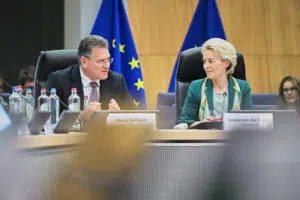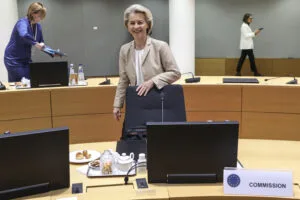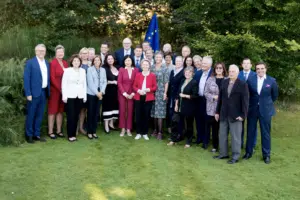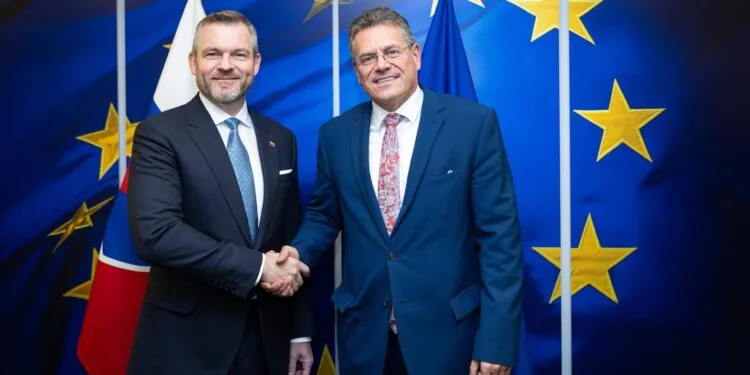Brussels – While the attention of EU leaders is all on the nominations of senior officials of Union institutions at the informal summit held today (June 17), a little appetizer comes from Slovakia. “On the occasion of the informal meeting of EU leaders, I will inform our European partners that Slovakia’s candidate for our next European Commissioner is the current EU Commission Executive Vice-President, Maroš Šefčovič,” Slovak president, Peter Pellegrini said, entering the Europa Palace. Šefčovič thus becomes the second member of the current von der Leyen cabinet to be reappointed by his government in the formation of the next European Commission.

“The nomination is based on his long-term excellent professional track record and invaluable experience,” continued Pellegrini — who replaced Slovakia’s Prime Minister, Robert Fico, recovering from the assault suffered in May — and reiterating that “it is also an expression of continuity and appreciation for his solid position within the Commission.” In the event of reappointment, Šefčovič would thus reach his fourth consecutive term: after serving as acting Commissioner for Education, Culture, Multilingualism, and Youth (between 2009 and 2010), the Slovak politician was appointed Vice-President for Inter-Institutional Relations and Strategic Perspectives in the Barroso II Commission (2010-2014), Commissioner for the Energy Union in the Juncker Commission (2014-2019), and Vice President for Inter-institutional Relations and Strategic Perspectives in the von der Leyen Commission (2019-2024), also taking over as Executive Vice President for the European Green Deal after the departure of his Dutch colleague, Frans Timmermans, in 2023.
It was the current Social Democratic members of the red-brown government coalition in Slovakia that was responsible for Šefčovič’s first appointment and subsequent two confirmations at the Commission: in both 2009 and 2014, the current PM Fico was in office, while the last time, in 2019, the head of government in Bratislava was the current President Pellegrini, who, in 2024, in another capacity, took responsibility for the announcement. Šefčovič has been a member of Fico‘s Smer-Ssd party since 1999, and in Brussels, Slovakia’s choice of candidates in the future team of European Commissioners seemed almost a foregone conclusion. Opening the waltz of candidates last week was Latvian Premier Evika Siliņa, who announced the confirmation of the EU Commission’s current Executive Vice-President for the Economy, Valdis Dombrovskis, for another five years at the Commission in the College of European Commissioners. Pending decisions by the 27 EU leaders on the appointments, the current EU Commission President Ursula von der Leyen is in pole position to succeed herself, with Germany backing her after the outcome of the European elections and given the new balance between the parties that will form the new majority in the EU Parliament.

According to the EU Treaties, European Commissioners – one for each member country – are appointed by agreement between the EU Commission Presidency and the member states, which suggests them based on “general competence,” “European commitment,” and “guarantees of independence.” The Council of the European Union adopts the list of Commissioners, who must also pass the European Parliament vote. Therefore, it is not only the political composition of the government nominating its candidate that should be considered but also the majority that supports the Commission in the European Parliament. In other words, a government unbalanced to the right will not be able to overlook the fact that it will have to cash in on the approval of the center-left as well: this is the case, for example, of Giorgia Meloni’s Italian government, which will have to look for a name that is also acceptable for the Democratic Party, which in the new legislature constitutes the largest delegation within the group of the Progressive Alliance of Socialists and Democrats (S&D).
Slovakia, Latvia and the race for the future EU Commission
Of the 27 members of the current College of European Commissioners, there are a few with the prospect of remaining at the Commission for another five years. In addition to von der Leyen running for confirmation as President, Latvia’s Dombrovskis reappointed from Riga, Slovak Šefčovič reappointed from Bratislava, Hungary’s Olivér Várhelyi (Commissioner for Enlargement and Neighborhood Policy) also has a good chance. Czech Věra Jourová(Vice-President for Values and Transparency), Bulgarian Iliana Ivanova (Commissioner for Innovation, Research, Culture, Education, and Youth), and Cypriot Stella Kyriakides (Commissioner for Health and Food Safety) can still play their cards. The respective countries have not experienced any upheavals in the past five years. In Bulgaria, the political situation has been uncertain for years, so the presence of Gerb’s center-right in government might be enough to confirm the appointment of the Commissioner who took office only one year ago. Without other political calculations, it cannot be ruled out that she could remain in Brussels.

For those whose countries saw a passing of the baton between national political forces, it is a different story, upending the possibility of confirmation in the team of European Commissioners. It is the case of Denmark’s Margrethe Vestager (Vice-President for Digital and Commissioner for Competition), Finland’s Jutta Urpilainen (Commissioner for International Partnerships), the Luxembourger Nicolas Schmit (Commissioner for Labor and Social Rights, as well as Spitzenkandidat of the European Socialists at the Europeans), Dutch Wopke Hoekstra (Commissioner for Climate Action), Poland’s Janusz Wojciechowski (Commissioner for Agriculture), Portugal’s Elisa Ferreira (Commissioner for Cohesion and Reforms), Sweden’s Ylva Johansson (Commissioner for Home Affairs), and Italy’s Paolo Gentiloni (Commissioner for Economy).
Then there are the three European Commissioners expected to take office as MEPs after the successful outcome of the European elections, unless the respective governments indicate otherwise before the inaugural session of the EU Parliament on July 16: Croatia’s Dubravka Šuica (Vice-President for Democracy and Demography), Lithuania’s Virginijus Sinkevičius (Commissioner for Environment, Oceans, and Fisheries), and Romania’s Adina Vălean (Commissioner for Transport). On the other hand, Belgian Didier Reynders (Commissioner for Justice) is running for Secretary General of the Council of Europe and will impose on the outgoing government after the June 9 federal election to find a new candidate. The French name depends on the outcome of the June 30 snap elections (Thierry Breton was in pole position, but not if the government switches to the far-right Rassemblement National), while in Italy, the Meloni government would have several options on the table, among which the most credible could be that of the current Minister for European Affairs, Raffaele Fitto.
English version by the Translation Service of Withub









